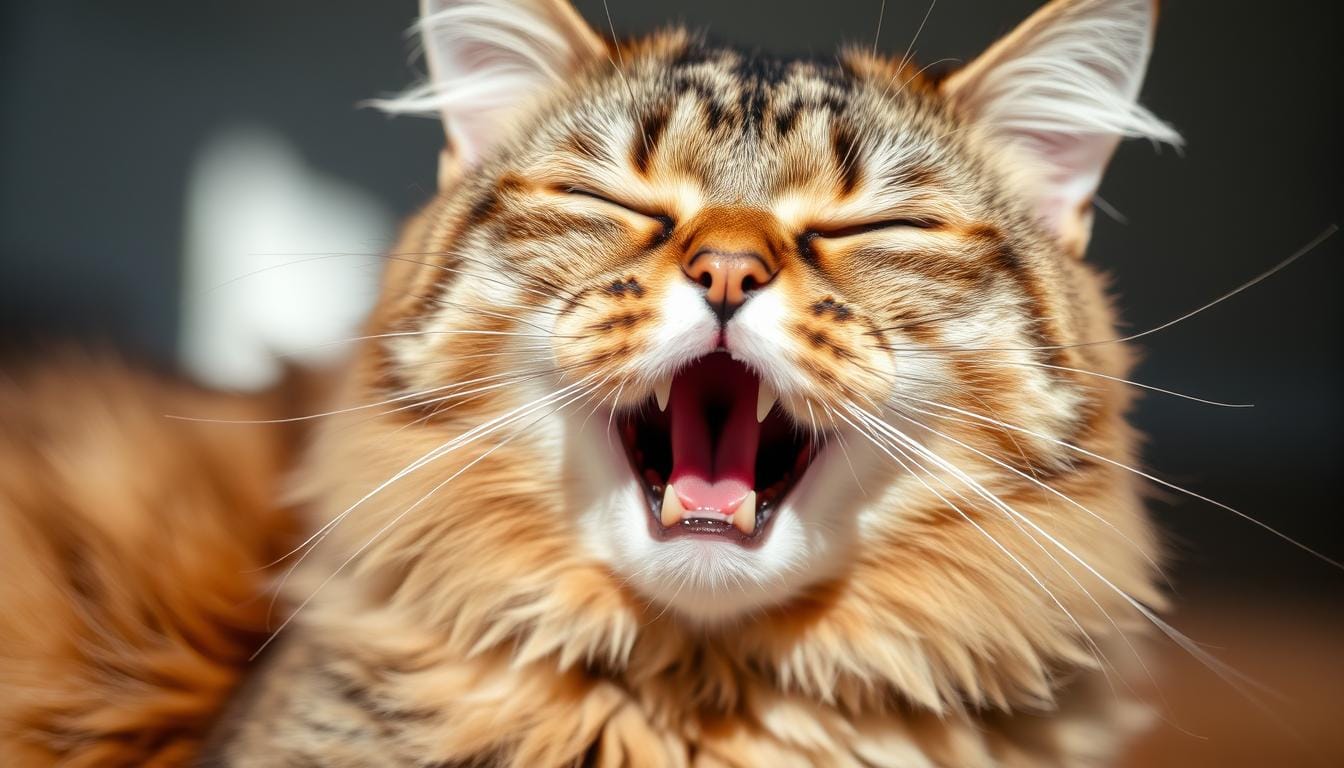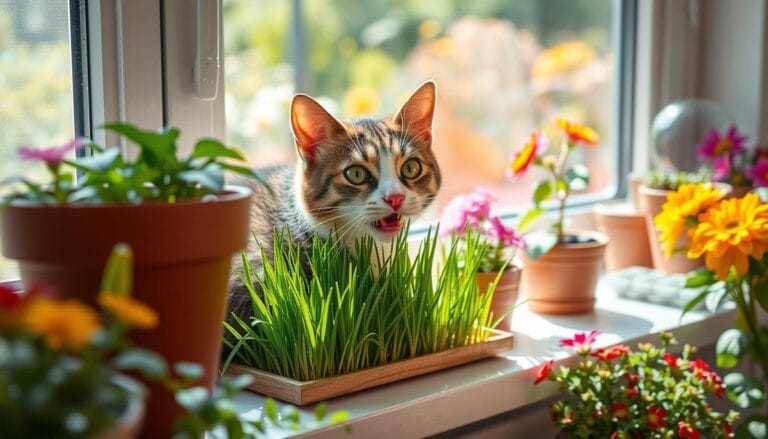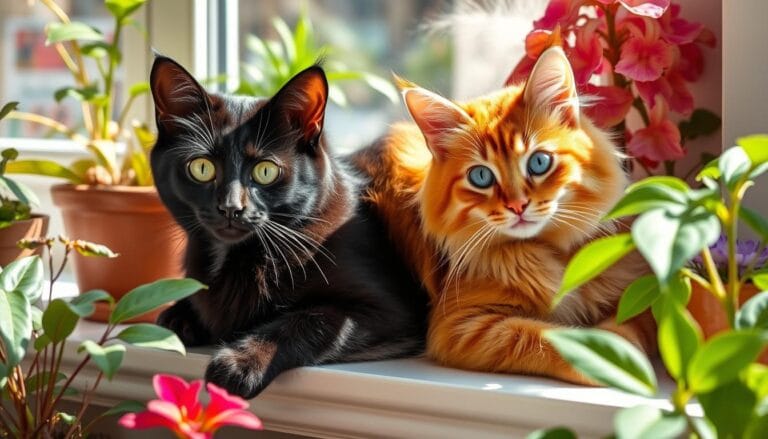Why is Your Cat Sneezing? Find Out Now
Did you know sneezing is a common health issue in cats? If your cat sneezes a lot, you might worry about their health. Over 80% of upper respiratory infections in cats are caused by viruses.
As a cat owner, you’re probably worried about your cat’s sneezing. Cat sneezing can be due to many reasons, from minor irritants to serious health issues. In this article, we’ll look at the possible causes of cat sneezing. We’ll help you figure out if it’s a minor issue or something serious.
Table of Contents
Whether your cat sneezes due to a minor issue or something more serious, their health is important. Cats over four years old often have dental disease. This shows that sneezing can be a sign of a health problem.
Key Takeaways
- Your cat’s sneezing can be caused by many factors, including viruses and bacteria.
- More than 80% of upper respiratory infections in cats are caused by viruses.
- Cat sneezing can be a sign of a serious health issue if it lasts for weeks or months.
- Regular sneezing for more than a couple of days may mean you need to see a vet.
- Treatment for sneezing in cats can include antibiotics and humidifiers.
- If your cat sneezes a lot, seeing a vet is important to find the cause and treatment.
- Cat sneezing can be managed with antihistamines and by removing harmful substances from your home.
Understanding Normal vs. excessive Cat Sneezing
As a cat owner, knowing when your cat sneezes normally is key. If your cat sneezes a lot, it might be a worry. But, occasional sneezes are usually okay. If sneezing doesn’t stop or other symptoms appear, see a vet.
When your cat sneezes and coughs, it could mean an upper respiratory infection. This is a common reason for sneezing in cats. Viruses like feline herpesvirus or feline calicivirus can cause it. Other signs include nasal or eye discharge, fatigue, fever, drooling, less appetite, and swollen lymph nodes.
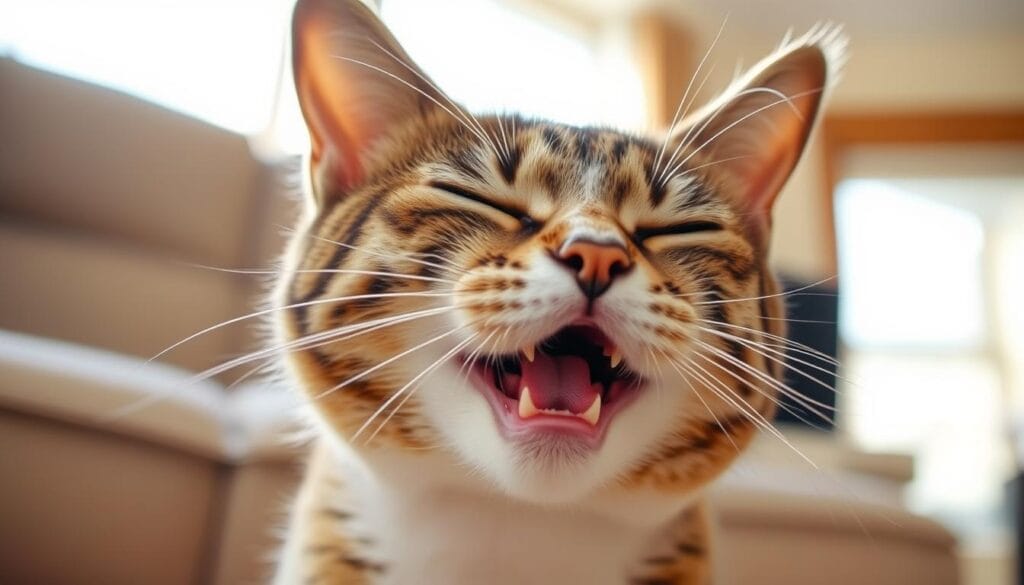
- Excessive sneezing that lasts for more than a few days
- Discharge from the eyes or nose that is yellow or green
- Loss of appetite or lethargy
- Drooling or difficulty breathing
If you see these symptoms, it’s important to take your cat to the vet. Your vet can run tests to find out why your cat is sneezing. They can then treat your cat to make them feel better.
Common Causes of Cat Sneezing
As a cat owner, it can be worrying when your kitty sneezes a lot. Sneezing is normal, but too much can mean there’s a problem. Vets say most sneezing in cats isn’t serious and can be fixed with the right care.
Dental disease, inhaled irritants, and viral infections are common reasons for cat sneezing. Dental disease can make cats sneeze, mainly if it’s in the mouth. Other reasons include bacterial infections, fungal infections, and tumors in older cats.
Sneezing can mean different things for cats’ health. If your cat sneezes a lot, see a vet to find out why. They might do tests to see how serious it is.
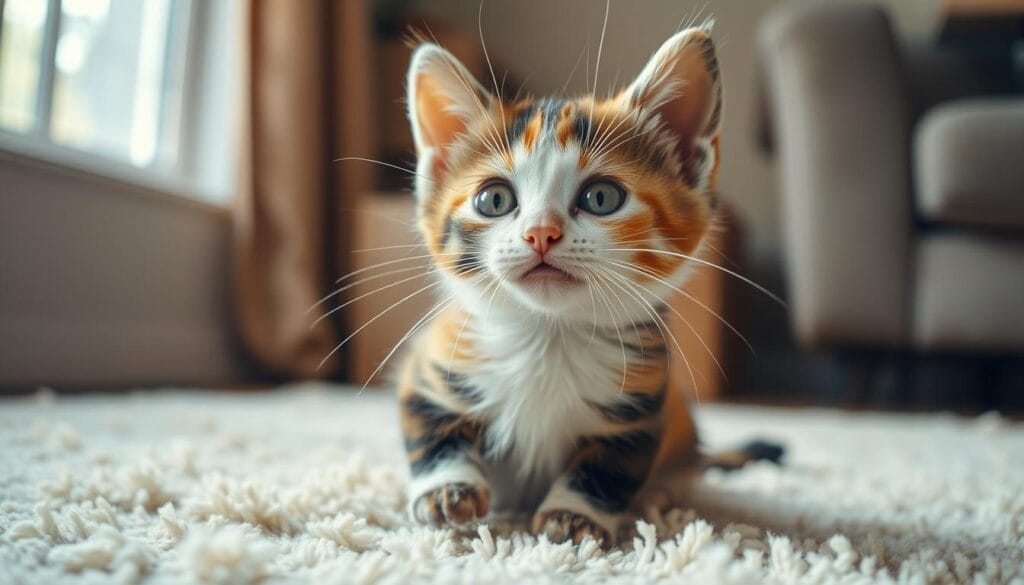
Sneezing can also mean allergies or sensitivities in cats. They can be allergic to bites, food, or things in the environment. Finding and fixing the cause of your cat’s sneezing is key to their health.
Viral Infections that Make your Cat Sneeze
If your cat is sneezing a lot, it might be due to a viral infection. Feline herpesvirus and calicivirus are common causes. These viruses lead to upper respiratory infections, causing sneezing, runny eyes, and nasal discharge. In severe cases, they can cause pneumonia or other serious problems.
Understanding why your cat sneezes is key to finding a cure. While there’s no cure for these viruses, treatments can manage symptoms and prevent other infections. Regular vaccinations can also help prevent these viruses in cats.
Some key facts about feline calicivirus include:
- It is a highly contagious virus that can spread through direct contact with an infected cat’s bodily secretions.
- The incubation period is typically between 2-6 days, after which clinical signs appear.
- Infected cats can shed the virus for several weeks, even after symptoms have resolved.
Other viral infections can also make cats sneeze. If you think your cat has a viral infection, see a vet. They can help find the best treatment and cure for your cat’s sneezing.
Bacterial Infections and your Sneezing Cat
When your cat sneezes a lot, it’s important to think about bacterial infections. Bacterial infections like bordetella and chlamydophila can make cats sneeze. Knowing about these infections helps you care for your cat better.
Some common bacterial infections that cause cat sneezing are:
- Bordetella
- Chlamydophila
These infections spread easily and might need antibiotics. It’s key to work with your vet to find the right treatment for your cat.
If your cat has a bacterial infection, they might also have runny eyes, nasal discharge, and feel tired. In bad cases, it can lead to pneumonia. By spotting these signs and getting vet help, you can help your cat feel better and stop sneezing.
Environmental Triggers for Cat Sneezing
As a cat owner, you know cat sneezing and coughing can come from many things. If your kitty keeps sneezing, it might be because of things in your home, allergies, or sensitivities to chemicals. Common culprits include pollen, mold, dust mites, and cleaning products. These can make your cat sneeze as a way to protect itself.
Some common things that can make cat sneezing and coughing happen include:
- Pollen and mold
- Dust mites and household cleaning products
- Strong smells from paints, perfumes, or cigarette smoke
- Dry air, which is more common in winter
When your cat is exposed to these, it can irritate their nose. This leads to cat sneezing and coughing. If you think your cat’s sneezing is from something in their environment, there are ways to help.
Understanding what causes cat sneezing and coughing helps you protect your cat. Whether it’s from something in their environment or not, seeing a vet is key. They can figure out why your cat is sneezing and help make it stop.
When to Take your Sneezing Cat to the Vet
If your cat is sneezing and you’re worried, knowing when to see a vet is key. Cat sneezing can mean different things, from simple irritants to serious health issues. It’s important to know when your cat needs a vet’s help to get the best care.
Look at how often and how bad your cat’s sneezing is. If it keeps happening or comes with other signs like coughing or runny eyes, it’s time to go to the vet. These could be signs of a virus or bacteria, like feline herpesvirus, which can cause long-term cat sneezing problems.
Other reasons to see a vet include yellow-green discharge, nasal stuffiness, or signs of dehydration. Also, if your cat’s sneezing gets worse or is caused by things in the air, you should act fast. This helps keep your cat healthy and happy.
By spotting these signs and getting vet help when needed, you can make sure your cat gets the right treatment. Whether it’s for a small problem or something bigger, knowing when to go to the vet is essential. It helps keep your pet healthy and happy.
Home Remedies for Cat Sneezing
If your kitty keeps sneezing, it can worry you. But, many times, cat sneezing can be treated at home. Always check with a vet first to make sure there’s no serious issue.
Safe ways to help your cat include using a humidifier. It adds moisture to the air, easing congestion. An air purifier can also help by removing bad stuff from the air. Plus, keeping your cat hydrated and fed well can boost their immune system and cut down on sneezing.
It’s also key to make a comfy space for your cat to recover. Remove things that might irritate them, like strong cleaners or perfumes. Using a vaporizer can also add moisture and ease congestion.
In some cases, your vet might suggest over-the-counter antihistamines. But, only use cat-specific meds, as human ones can harm them. By trying these home remedies and following your vet’s advice, you can help your cat feel better and sneeze less.
Preventing Future Sneezing Episodes
As a cat owner, you want your pet to be healthy and happy. It’s important to prevent sneezing episodes to keep your cat well. Regular vet visits help catch health problems early, like those that cause cat sneezing.
Keeping your home clean is key to reducing cat sneezing and coughing. Use air purifiers, cut down on dust and pollen, and keep your cat’s area tidy. Also, a strong immune system helps prevent sneezing. A good diet, exercise, and enough sleep boost your cat’s immune system.
- Vaccination schedule: Keep your cat up-to-date on their vaccinations to prevent diseases that can cause sneezing.
- Environmental modifications: Reduce exposure to environmental irritants such as dust, pollen, and smoke.
- Maintaining your cat’s immune system: Ensure your cat has a healthy diet, regular exercise, and adequate sleep to keep their immune system strong.
Medical Treatments your Vet may Recommend
If your kitty keeps sneezing, it might be due to a medical issue. Your vet could suggest treatments to ease the symptoms. These can include antibiotics and antihistamines to help your cat feel better.
Some common treatments for cat sneezing include:
- Antibiotics to treat bacterial infections
- Antihistamines to reduce allergic reactions
- Anti-inflammatory medications to reduce swelling and congestion
Your vet will choose the best treatment based on your cat’s sneezing cause.
Working closely with your vet is key to finding the right treatment for your cat. Knowing about these medical options helps you give your cat the best care. This way, your cat can recover quickly and feel better soon.
Conclusion: Keeping your Cat Healthy and Sneeze-Free
Understanding why cats sneeze is important for their health. Knowing when to see a vet is also key. If your cat is sneezing a lot, it’s important to act fast.
Keeping your cat’s environment clean can help prevent sneezing. Also, addressing any health issues quickly is vital. This way, your cat can live a happy, sneeze-free life.
FAQ
What constitutes normal sneezing in cats?
Cats usually sneeze a few times a day. Sneezing more than that might mean there’s a problem.
When should you be concerned about your cat’s sneezing?
Be worried if your cat sneezes a lot, has trouble breathing, or shows other signs like coughing or loss of appetite. These could be signs of a serious issue.
What are the common causes of cat sneezing?
Cats sneeze for many reasons. This includes viruses, bacteria, irritants in the air, and health problems.
What viral infections can cause your cat to sneeze?
Feline herpesvirus and calicivirus are common culprits. They cause sneezing, runny nose, and coughing.
What bacterial infections can lead to cat sneezing?
Bacteria like bordetella and chlamydophila can also make cats sneeze. They cause inflammation in the nose and throat.
What environmental triggers can make your cat sneeze?
Things like dust, pollen, and chemicals can make cats sneeze. So can allergies and certain smells.
When should you take your sneezing cat to the vet?
Take your cat to the vet if they sneeze a lot, have trouble breathing, or show other signs of illness. It’s key to find out why and treat it.
What home remedies can help a sneezing cat?
Using a humidifier, keeping their space clean, and giving them soothing foods can help. But always check with your vet first, if the sneezing is bad.
How can you prevent future sneezing episodes in your cat?
Keep your cat’s vaccinations up to date, keep their environment clean, and boost their immune system. Regular vet visits are also important to catch any health issues early.
What medical treatments may your vet recommend for a sneezing cat?
Your vet might suggest antibiotics, antihistamines, or other treatments. This depends on what’s causing the sneezing and any other health problems.
There are no reviews yet. Be the first one to write one.

